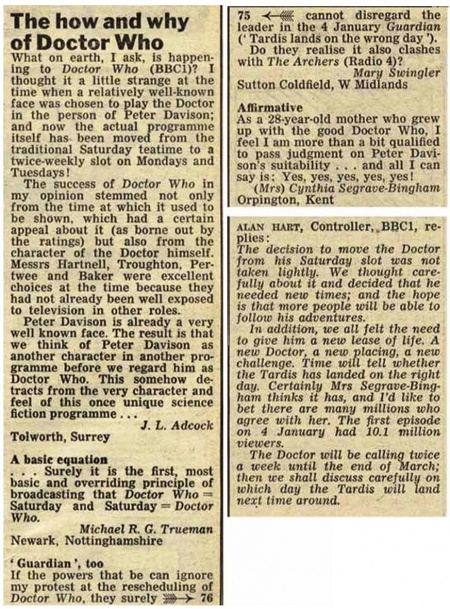The how and why of Doctor Who
- Publication: Radio Times
- Date: 1982-01-30
- Author:
- Page: 75
- Language: English
What on earth, I ask, is happening to Doctor Who (BBC1)? I thought it a little strange at the time when a relatively well-known face was chosen to play the Doctor in the person of Peter Davison; and now the actual programme itself has been moved from the traditional Saturday teatime to a twice-weekly slot on Mondays and Tuesdays!
The success of Doctor Who in my opinion stemmed not only from the time at which it used to be shown, which had a certain appeal about it (as borne out by the ratings) but also from the character of the Doctor himself. Messrs Hartnell, Troughton, Pertwee and Baker were excellent choices at the time because they had not already been well exposed to television in other roles.
Peter Davison is already a very well known face. The result is that we think of Peter Davison as another character in another programme before we regard him as Doctor Who. This somehow detracts from the very character and feel of this once unique science fiction programme...
J. L. Adcock
Tolworth, Surrey
A basic equation
... Surely it is the first, most basic and overriding principle of broadcasting that Doctor Who = Saturday and Saturday = Doctor Who.
Michael R. G. Trueman
Neward, Nottinghamshire
'Guardian', too
If the powers that be can ignore my protest at the rescheduling of Doctor Who, they surely cannot disregard the leader in the 4 January Guardian ('Tardis lands on the wrong day'). Do they realise it also clashes with The Archers (Radio 4)?
Mary Swingler
Sutton Coldfield, W Midlands
Affirmative
As a 28-year-old mother who grew up with the good Doctor Who, I feel I am more than a bit qualified to pass judgment on Peter Davison's suitability ... and all I can say is: Yes, yes, yes, yes, yes!
(Mrs) Cynthia Segrave-Bingham
Orpington, Kent
[Cartoon: One man says to another in the Programme Planning Office, 'We're using the Tardis to put the repeats on first."
Alan Hart, Controller, BBC1, replies:
The decision to move the Doctor from his Saturday slot was not taken lightly. We thought carefully about it and decided that he needed new times; and the hope is that more people will be able to follow his adventures.
In addition, we all felt the need to give him a new lease of life. A new Doctor, a new placing, a new challenge. Time will tell whether the Tardis has landed on the right day. Certainly Mrs Segrave-Bingham thinks it has, and I'd like to bet there are many millions who agree with her. The first episode on 4 January had 10.1 million viewers.
The Doctor will be calling twice a week until the end of March; then we shall discuss carefully on which day the Tardis will land next time around.
Disclaimer: These citations are created on-the-fly using primitive parsing techniques. You should double-check all citations. Send feedback to whovian@cuttingsarchive.org
- APA 6th ed.: (1982-01-30). The how and why of Doctor Who. Radio Times p. 75.
- MLA 7th ed.: "The how and why of Doctor Who." Radio Times [add city] 1982-01-30, 75. Print.
- Chicago 15th ed.: "The how and why of Doctor Who." Radio Times, edition, sec., 1982-01-30
- Turabian: "The how and why of Doctor Who." Radio Times, 1982-01-30, section, 75 edition.
- Wikipedia (this article): <ref>{{cite news| title=The how and why of Doctor Who | url=http://cuttingsarchive.org/index.php/The_how_and_why_of_Doctor_Who | work=Radio Times | pages=75 | date=1982-01-30 | via=Doctor Who Cuttings Archive | accessdate=23 December 2025 }}</ref>
- Wikipedia (this page): <ref>{{cite web | title=The how and why of Doctor Who | url=http://cuttingsarchive.org/index.php/The_how_and_why_of_Doctor_Who | work=Doctor Who Cuttings Archive | accessdate=23 December 2025}}</ref>
